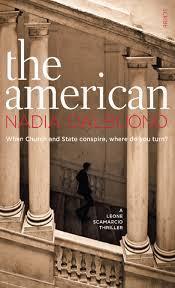 As I mentioned, I’ve got a couple of reviews outstanding, and this is the first one for which I’m part of a blog tour. The American by Nadia Dalbuono comes with a sticker on the front promising you your money back if you don’t love it as much as a Donna Leon novel – perhaps the most famous crime writer currently working from Italy. Given that the novel is based in Italy, I guess Donna Leon becomes the most obvious point of reference, but stylistically, Dalbuono is so very different that other comparisons came to my mind. If you like John le Carre, or Charles Cumming or Sara Paretsky, then I think you’d like this. It’s a very sophisticated, intelligent piece of fiction writing, and one that functions on the intersection of crime and politics.
As I mentioned, I’ve got a couple of reviews outstanding, and this is the first one for which I’m part of a blog tour. The American by Nadia Dalbuono comes with a sticker on the front promising you your money back if you don’t love it as much as a Donna Leon novel – perhaps the most famous crime writer currently working from Italy. Given that the novel is based in Italy, I guess Donna Leon becomes the most obvious point of reference, but stylistically, Dalbuono is so very different that other comparisons came to my mind. If you like John le Carre, or Charles Cumming or Sara Paretsky, then I think you’d like this. It’s a very sophisticated, intelligent piece of fiction writing, and one that functions on the intersection of crime and politics.
Detective Leone Scamarcio is a good guy in a bad world. He’s a cop with the flying squad in Rome, but his background is with the Mob – his late father used to be a prominent member (if that’s the right term). Scamarcio is trying to do everything by the book, but that isn’t easy in an Italy that’s fundamentally corrupt, and where the police are under pressure from both politicians and the church to keep secrets and turn a blind eye. In this, the second novel in the series, Scamarcio also has the added complication of a girlfriend he isn’t sure he wants, Aurelia, who works in the pathology department. You kind of fear for her from the start, and goodness knows she’s in for more trouble in the course of this novel than just a commitment-phobe for a boyfriend.
The catalyst for Scamarcio’s inquiry is an apparent suicide, hanging off the Ponte Sant’Angelo, close to the Vatican City. This John Doe seems to be a banker suffering from the economic hardships blighting much of southern Italy, but there’s something about the way the body has been presented that makes Scamarcio think of an older case, the 1982 murder of a man called Robert Calvi who was called ‘God’s Banker’ because of his dodgy links with the Vatican Bank. And then, when a senior priest is found stabbed in the Vatican City, it seems obvious that some sort of link must be forged between the bodies. But how that can happen, when the local police have no jurisdiction over the Vatican (which is steadfastly not seeking their help), and the original body is nicked from the mortuary by two American secret service agents who don’t seem quite the full ticket, is anybody’s guess. Scamarcio is asked, none too politely, by the Americans to let it go – it’s a simple suicide, nothing for the police in Rome to be bothered about. But his instincts tell him the case is far more complex and far more dangerous, and he keeps digging.
He will eventually embroil himself in a long-standing and deep-rooted conspiracy that stretches between America and Italy and involves the shocking manipulation of political power by both church and government. I don’t want to give too much away as the gradual uncovering of the extent of the situation is one of the best features of the novel. Suffice to say, my regular complaints that too much contemporary fiction boils down to a storm in a teacup are not about to be aired here. This is a novel that really goes for the jugular, and had me looking up bits and pieces of international history on the internet (Mr Litlove didn’t believe some of the events described in the novel had actually happened, and was forced to eat his words). I learned a lot, whilst admiring the way that Nadia Dalbuono handles the intricacies of her plot, and the way that she muddies the water before the conclusion. Trust me, she is one smart writer.
If I had a niggle, it would be with the paragraphs in italics which open some of the chapters and describe scenes that occurred way back in the past. They are meant to be enigmatic, but initially I was quite confused. I could have done with a better grounding in world politics too, in all honesty, but that didn’t matter so much; the novel will tell you all you need to know to understand it. On the plus side this is extremely well-written and very cleverly conceived. Scamarcio is a strong character, torn between his desires to act ethically, and his old contacts who could actually achieve some beyond-the-pale justice for him, the sort of justice it’s almost impossible to mete out legally in current day Italy. There’s violence in the novel, viewed unflinchingly, but nothing gratuitous. All in all, this is a properly first-rate, literary, fiercely contemporary and proudly intelligent thriller. I must say I’m really intrigued now to see how Dalbuono manages to save Scamarcio from the situation he’s in by the finale – I’m not sure he could survive a long series. We may have to savour his few cases while he holds out.
